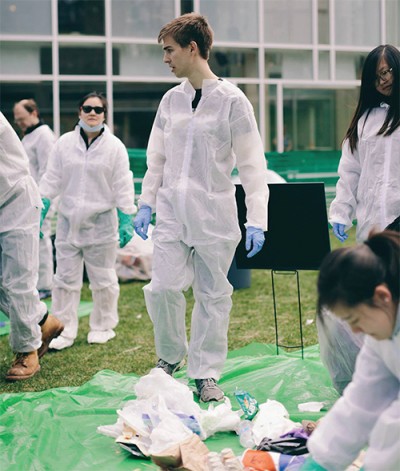
Photo: Sam Sklar ’17
Alex Davis, coordinator of the Babson Sustainability Office
This is not a normal magazine assignment.
The Babson Sustainability Office is holding a waste audit, which is another way of saying students will be digging through piles of refuse, with their hands, to assess rates of recycling and composting. I admire their dedication. Initiatives like this probably helped the College earn its gold STARS (Sustainability Tracking, Assessment & Rating System) rating. But I must admit the effort sounds, well, a bit gross. My assignment is to write about the audit—and participate.
I arrive to find students dressed in plastic gloves, shoe booties, and protective suits. They sift through waste from Horn Library, Reynolds, and the new residence hall, Park Manor West. Inexplicably, a DJ also is playing music. I immediately seek out Alex Davis, the office’s sustainability coordinator. I want to know what I’m getting into. “Is it fresh trash?” I ask him.
“Yes,” says Davis. “It was picked up last night.” I delicately ask my next question: “Is it smelly?” Davis says not to worry. “It’s only a day old. It’s not that bad. Trash isn’t instantly nasty.”
The participating students, a mix of fraternity members volunteering their time and Sustainability Office interns, go through the waste and separate it into three bags: one each for compost, recycling, and trash. “I see it as an archaeological dig,” says Hannah Esberg ’15. “You can tell a lot about behavior. You see people’s habits.”
Those habits aren’t always pretty. Lots of uneaten food lurks in the waste, as well as nearly full bottles of water and milk, and many recyclable objects were thrown in with the trash. Items that could have been given to Goodwill pop up in the residence hall rubbish: shoes, shirts, an unopened toothbrush.
The students handle the waste like pros. “It’s an interesting experience,” says Jake Shaver ’16. “It’s repulsive, but it needs to be done.” Meanwhile, DJ Sam Sternweiler ’17 continues playing high-energy hip-hop to keep the sorters sorting. Babson College Radio’s general manager, Sternweiler provides music for many campus happenings, but he usually performs at fairs and Roger’s Pub. “This is not a typical event,” he says.
Donning protective gear, I dig in with the students. I quickly have questions. Can you recycle aluminum foil? (Yes, if it’s clean.) What about plastic bags and snack wrappers? (No.) Occasionally, a wind kicks up, which scatters litter. “That makes it exponentially more difficult,” says Brandon Schwartz ’17. Picking through the waste isn’t too icky until we reach the end of the pile, where all that’s left is the dregs, of which I’ll spare the reader further details.
The sorted waste is weighed, and the numbers tell a story. For starters, a compost bin is needed in Horn since so many students eat there, Davis says. More education also is required about composting and recycling. Of the items originally thrown into trash cans, almost 40 percent could have been recycled. Another 36 percent could have been composted. “That’s wasted resources,” Esberg says. In total, the students sift through 213 pounds of waste. As the audit wraps up, I pass by the leftover free pizza and hurry to wash my hands.—John Crawford
